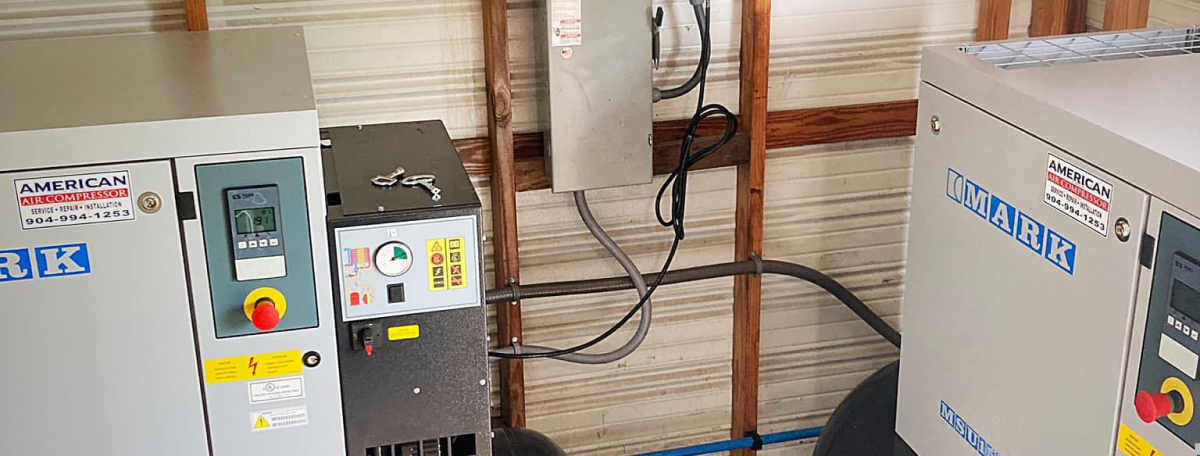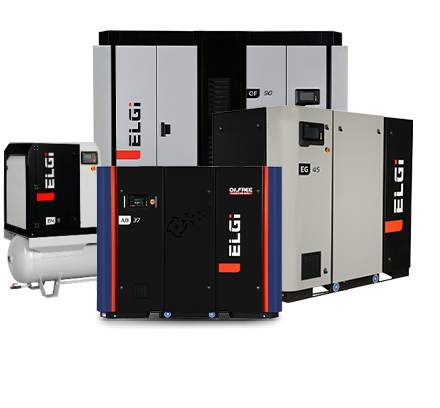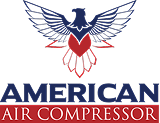Faq's
Industrial FAQ
Questions about Compressors


FREQUENtly asked questions
Common Air Compressor Related Questions we get in Florida
Unsure if the issue you are having with your air compressor is only a YOU problem or if it is common amongst all air compressor owners? Check out the FAQs we see in the Air Compressor industry to see if we can answer simple questions about your air compressor!
How often should I schedule air compressor maintenance in Florida?
Florida’s high heat and humidity stress air compressors, so we recommend every 2,000 to 4,000 operating hours, or at least bi-annually, to prevent overheating, moisture-related damage, and premature wear
Why is my compressor overheating in hot and humid conditions?
Excessive ambient temperature, poor airflow, clogged filters, or insufficient oil can cause overheating. Florida’s subtropical climate exacerbates these issues, so regular filter changes, proper ventilation, and fluid checks are essential .
What causes water buildup in air lines, and how do I prevent it?
High humidity leads to moisture in compressed air systems. Without a working dryer or moisture separator, water can damage tools and systems. Installing reliable dryers and regularly draining tanks keeps your air lines dry and safe
Can humidity cause internal compressor damages in Florida?
Yes—moisture can corrode internal parts, degrade oil, damage valves, and cause rust. Regular drying, tank draining, and fluid changes are crucial in Florida’s humid environment
Compressor repair faqs
Additional Questions we see in the industry
Questions. You have them, we have the solutions. Check out some additional FAQs we see in the Air Compressor industry. If you don’t see the answer to a question, you may have, don’t hesitate to message us for answers!
How do I know if my compressor has a persistent air leak?
Listen for hissing at fittings, valves, or hoses. Use soapy water to locate leaks—bubbles will form. Tighten or replace seals and fittings. Unchecked leaks can waste thousands in energy costs
Why does my compressor keep tripping circuit breakers?
This often results from overloaded circuits, overheating, damaged wiring, or a failing motor. Ensure proper electrical installation, verify breaker capacity, and inspect components to avoid repeated trips
Do you service oil-free compressors for medical or food industries?
Absolutely. We specialize in oil-free air systems, ideal for sensitive applications like healthcare, food processing, and labs—ensuring zero oil carryover and maintaining compliance with industry standards.
Can I repair my air compressor myself?
It is not recommended by most manufacturers that you should attempt any repairs on your own as they can cause more damage without training or deeper understanding of most air compressor systems.
What brands and types of compressors do you repair?
We service all major brands, including but not limited to ELGi, Quincy, OZEN, Atlas Copco, Sullair, and Ingersoll Rand, in both rotary screw and reciprocating (piston) configurations
How long do most compressors last?
The lifespan of an air compressor depends on the type, usage, and how well it’s maintained. On average, a well-maintained rotary screw compressor can last 15–20 years, while piston (reciprocating) compressors typically last 8–15 years. In Florida’s high-humidity climate, regular servicing is crucial to protect against corrosion, moisture buildup, and premature wear. Preventative maintenance and proper sizing can significantly extend the life of your equipment.
What should I do if my air compressor has low pressure?
Low pressure can be caused by several issues, including air leaks, clogged filters, failing valves, or an undersized system. First, check for leaks around fittings and hoses, clean or replace intake filters, and verify that your demand doesn’t exceed the compressor’s capacity. If pressure remains low, it’s best to contact a certified technician to perform a full diagnostic and recommend proper solutions — like storage upgrades or adjusting system design.
Why does my air compressor keep shutting off?
Frequent shutdowns often indicate overheating, electrical issues, low oil levels, or pressure switch problems. In Florida, poor ventilation combined with high temperatures can cause compressors to overheat quickly. Ensure your compressor is in a well-ventilated space, clean the cooling fins regularly, and check oil levels frequently. If the issue persists, professional servicing is recommended to avoid damage to internal components.
Can using the wrong size air compressor damage my equipment?
Yes — using a compressor that is too small can lead to inconsistent pressure, causing tools and machines to run improperly, overheat, or wear out faster. An oversized compressor, on the other hand, may cycle on and off too frequently, reducing efficiency and lifespan. Matching the right compressor size to your specific demand is essential to protect your equipment, ensure consistent airflow, and reduce energy waste. Our team can assess your air requirements and recommend the right solution for your operation.
Is emergency compressor service available after hours?
Yes—we provide 24/7 emergency repair services throughout Florida. Fast response times, evening and weekend support, and remote diagnostics help minimize your downtime.
What steps should I take if my compressor suddenly stops producing air?
Check for:
Power supply & breaker issues
Clogged filters or moisture blocks
Leak in hoses or fittings
Faulty pressure switch or intake valve
If simple fixes don’t resolve it, call a professional technician right away
